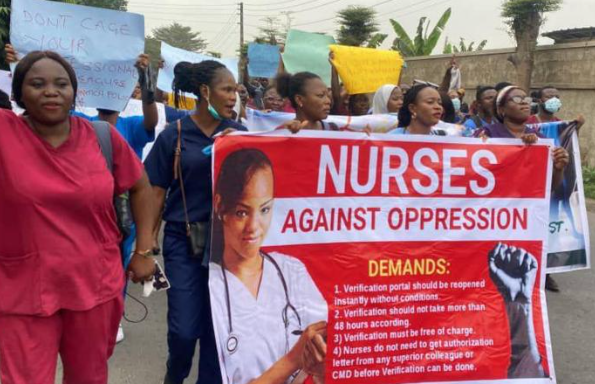By Joke Kujenya
NURSES ACROSS Nigeria are raising urgent concerns about the hostile work environments and excessive workloads they face in government health facilities.
These challenges, they argue, are driving many professionals out of the field and jeopardizing patient safety.
At a media briefing organized by the Nursing Group Administrators, the nurses protested the new certificate verification guidelines imposed by the Nursing and Midwifery Council of Nigeria (NMCN).
They detailed experiences of verbal abuse, humiliation, and exclusion at the hands of senior colleagues, which have led to mental health issues and pushed some to seek opportunities abroad.
A representative of the group, Edike Osemeke, highlighted that the combination of bullying and overwork is aggravating the nation’s nursing shortage and compromising patient care.
He criticized hospital managements for their reluctance to hire more staff, which forces younger nurses to shoulder lopsided workloads and contributes to a toxic work culture.
Osemeke called on the Ministry of Health and other relevant authorities to implement strict policies to prevent bullying, ensure fair distribution of workloads, and foster a supportive work environment to retain young nurses.
He emphasized the necessity of addressing these issues to prevent the migration of nurses to private facilities and non-clinical settings such as Health Maintenance Organisations (HMOs) and federal institutions.
The nurses also expressed strong objections to the NMCN’s new verification guidelines, arguing that the excessive documentation requirements and long waiting periods are impractical and hinder professional development, worsening the skills gap in the healthcare sector, Osemeke argued.
Another nurse, Cletus Onyekosor, confirmed the hostile work conditions, describing how young nurses are overworked, often forced to manage more patients than is safe or manageable noting that it leads to increased stress and burnout, negatively affecting patient care.
Onyekosor then called for immediate action from hospital administrators and policymakers, including the implementation of anti-bullying policies and better support systems for young nurses and other healthcare workers.
He stressed that the mental and physical health strains on nurses, including issues such as back pain, joint pain, infections, and various forms of abuse, are significant factors driving the high turnover rates in the profession.
Onyekosor also criticized the NMCN for not engaging in meaningful dialogue with stakeholders before implementing the new verification guidelines and demanded the immediate revocation of these rules and genuine consultation with nursing professionals to develop more practical and supportive regulations.
The nurses urged the council and government to implement a comprehensive feedback system to track the decision-making processes and challenges confronting healthcare workers while suggesting that this could include regular workforce surveys, exit interviews, and continuous dialogue with relevant associations.
“An evidence-based strategy would support more proactive and effective policy measures, ensuring both financial and non-financial incentives are in place to retain a skilled and motivated nursing workforce,” they emphasized.





